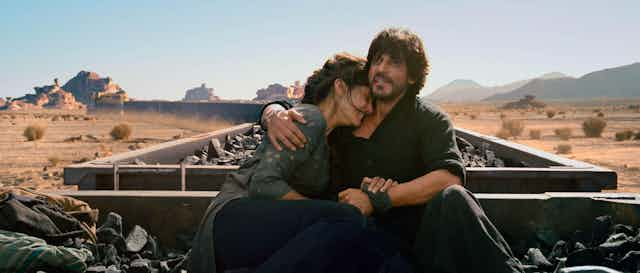The UK government’s efforts to send asylum seekers to Rwanda, which undermine the independence of Britain’s judiciary, highlight ongoing tensions within the British Conservative party.
They also mark a return to colonial-era forced mobility, particularly of non-white migrants. The British used a similar practice to establish and maintain colonies and control imperial and colonial borders – for example, through the forced relocation of people in the transatlantic slave trade and the dispossession and eviction of Indigenous peoples in white settler colonies.
They also transported British convicts to overseas colonies and, during the second world war, dispersed refugees to colonised territories.
There are echoes of empire in today’s anti-immigration legislation in the UK, but what is less discussed is how these practices shaped former British colonies such as India.
Dunki, a Bollywood film currently playing in cinemas, explores these issues. The film, directed by Rajkumar Hirani and featuring global superstar Shah Rukh Khan, details the travails, from the mid-1990s, of a group of Sikh friends from Punjab who migrate to the UK.
Unable to do so legally thanks to the barriers on legal migration for Commonwealth citizens, they decide to take the “donkey”, or illegal, route. This means travelling to a foreign land through a range of other countries.
While donkey routes are traditionally via train, boat or other means, the recent, real-life grounding of a chartered “US donkey flight” in France reveals that this method is changing with the times. The Romania-based Legend Airlines plane was on its way from Dubai to Nicaragua, from where the migrants would have travelled to the US border.
These journeys are not only difficult and dangerous, but expensive. To get to the US, the largely Punjabi migrants detained in France had reportedly promised to pay between £55,000 and £75,000 to corrupt immigration agents.
In Dunki, the donkey route takes the friends overland via Afghanistan and Iran, before they are smuggled by container ship to the UK. Along the way, three members of the group are murdered, one is threatened with rape, and they endure innumerable other hardships. And for those who make it, their situation improves little upon arrival in the UK.
Underpinning such adversities is colonialism and its legacies. In one moving scene, Khan’s character speaks at the funeral of a man who committed suicide after failing the English language test that would have enabled him to go to the UK.
When the British came to India, he says, “We never asked: ‘Do you know Hindi?‘ How dare they stop us, he asks, from going to their country because we don’t know their language?
Later in the film, a character suggests that Indians like her were only forced to go to the UK because of what the British had done to India.
Preserving the spoils of empire
Dunki also demonstrates the ironies of modern border restrictions in the UK. Although these, by design, largely bar the entry of the global poor, the labour such people provide is essential for maintaining the standards of living that Britons enjoy.
UK trade policies continue to generate a steady supply of both low-cost goods and labour from lower-income countries. Since Brexit, for example, the British government has pressured countries such as Ghana and Cameroon to sign trade deals that perpetuate impoverishment and industrialisation, and feed an exodus of migrant labour to the UK.
It is India, however, that remains the largest migrant-origin country in the world. India became the go-to destination for a new form of bonded labour known as indentured servitude following the formal abolition of slavery in Britain in 1833. But the displacement of up to 20 million people, particularly in Punjab, in the 1947 partition of India into two separate nation-states, fuelled a new exodus – including to the UK.
The ethnoreligious nationalism that fuelled partition continued to spawn further migration. This includes the genocidal violence, in 1984, that led to the death and dislocation of thousands of Sikhs. The cast of Dunki appears to leave India in the aftermath of such horrors. Yet instead of openly acknowledging this, the film displaces the genesis of its story to a decade later.
This is likely due to political concerns within India today. The governing Hindu ethnonationalist party, the BJP, has proposed sweeping new powers to censor films. The government already uses the threat of legal action to shape the content produced by streaming platforms, and employed emergency powers to ban a BBC documentary on the prime minister, Narendra Modi.
Since right-wing Hindu groups can also force a film to be withdrawn, it has become risky for filmmakers to explicitly address issues to do with ethnoreligious violence. Both India and Britain have a long way to go in acknowledging the ongoing relationship between colonialism, migration, and their legacies.

